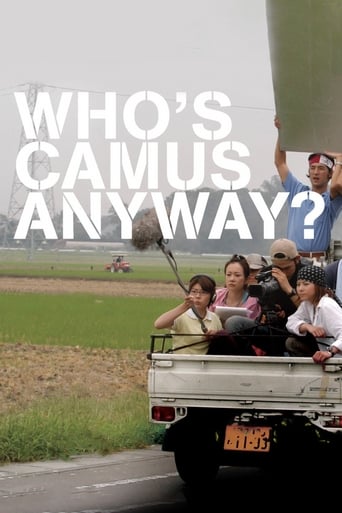



Memorable, crazy movie
just watch it!
Captivating movie !
It is not only a funny movie, but it allows a great amount of joy for anyone who watches it.
View MoreWHO'S CAMUS ANYWAY / THE BORED MURDERER (KAMYU NANTE SHIRANAI). Viewed on Streaming. Cinematography = seven (7); lighting = six (6) stars; subtitles/translations = four (4) stars; score = four (4) stars. Director Mitsuo Yanagimachi (who is also credited as the screen writer) uses a movie-in-a-movie plot (with some clever touches) that goes off the tracks and enters a realm of absurd existentialism. (This may make the viewer wonder if one movie might have gone into the editing suite, but another one came out!) A college literary class (using a recent headline-grabbing absurd murder committed by a Japanese schoolboy and an old novel (written by French author Albert Camus depicting a similarly absurd murder) becomes so obsessed with creating its movie (as a class term project) that they begin living their lives as if they were characters in the story line (or so it would seem). (All this transpires in a week or so.) Students chat a lot about movies often best known for cinematic techniques/tricks while the Director is duplicating these processes (like discussing films known for apparently long, unedited tracking shots while Yanagimachi is using a long, unedited tracking shot). The Director also inserts revealing nuances of behavior and characterization. Acting is a bit on the hammy side as actress and actors (and Yanagimachi) try to simulate Tokyo college campus life. Cinematography (wide-screen, color) is good, but exterior scenes can be seriously under lighted. Subtitles are too long given their on-screen flash rates. Using the same font and color simultaneously for dialog and opening credits can be confusing (without very careful reading). Signs, postings, etc. are not translated. Score is quite good. Unfortunately it is often in the wrong movie! Music usually does not "fit" the scene and can distract rather than add to on-screen events. Not especially recommended. WILLIAM FLANIGAN, PhD.
View MoreHaving read various reader and critic comments regarding Yanagimachi Mitsuo's inventive "Camus Nante Shiranai", I was curious to see for myself what all the fuss was about. Granted "Camus.." is a very interesting film, particularly in the way Yanagimachi slowly unravels the lives of the central characters as they struggle with the production of their student film project, but the film left me with a very unsatisfied feeling at the end. Was what happened at the end reality or was is it the imagined fictional ending of the film project? I just don't know which one it was and perhaps that was Yanagimachi's intent...to blur the lines between the real world and the world of cinema and show how sometimes we can never know where the fiction ends. The performances were compelling and well acted particularly by Kawabara Shuji, Yoshikawa Hinano and Maeda Ai. Kuroki Meisa is definitely someone to watch as she makes for a great "film Madonna". I must admit that I was a bit lost with some of the references and tributes to other films that were in the film (mostly from French and European cinema) but definitely am impressed with the cinematography, particularly the various continual long takes (a la Robert Altman) that were in the film. I can't say that "Camus.." is for everyone but it will definitely make you think at the end.
View MoreWho's Camus, Anyway? follows the trials and tribulations of a group of Japanese university film students, more specifically, it follows the final five days of the shooting of their first film, which recounts the story of a high school student who killed an old lady just for fun. Each day leading to the film's conclusion is filled with tension and anxiety, ranging from long planning meetings to the character's daily lives. What makes Who's Camus, Anyway? a great experience though, is the great character development that is so prevalent throughout the film. From the impressive opening sequence, to its stunning conclusion, Who's Camus, Anyway? is a great character study.The private life of the various protagonists interferes with the preparation of the film, and the professor who oversees their works (nicknamed Aschenbach after the character in Death in Venice) must also cope with his own personal problems. Each character on the film crew is given ample screen time, and by the end of the film, I felt like I was actually part of the film crew myself. The film is essentially a film with a film, giving us (the viewer) an inside look into how a student film is actually made, from the budget, the casting, to eventually the shooting process. This all takes a backseat though, and what are mostly displayed are the character interactions, and this is where the film really shines. The director, Mitsuo Yanagimachi, shoots the film with a great eye for shot composition. Each shot is delicately taken with care and definitely gives the viewer a great perspective to the film's scenes. His choice of youthful actors was great as well; they each were able to play their parts convincingly and gave great performances. The music throughout the film was great and was a pleasure to listen too. It reminded of music that would be played during a play or opera, and this film certainly played out like one. The music was able to display the emotional impact of certain scenes quite well, and in some cases, enhanced the scenes significantly. My final say on this film is very short and consists of only three words; just see it. It's a magnificent film, with a great cast, music, and direction. It also raises questions such as "does art imitate life, or is it the opposite?", and with a stunning conclusion that will definitely have you speculating, how can you not appreciate this film? A totally engaging experience, I whole-heartedly recommend viewing this film, you will not be sorry.
View MoreThe last five days before the shooting of their first movie by a group of students in a film university in Japan. The film in the film is based on a the story of a student who killed an old lady to experience new feelings. As the beginning of the shooting approaches, tension increases, new problems arise everyday. The private life of the various protagonists interferes with the preparation of the film, and the professor who overviews their works (nicknamed Aschenbach after the character in Death in Venice) must also cope with his problems. A very gripping film played convincingly by young actors, and full of references to the films that have influenced them. Beautiful filming. The title comes from the fact that the main actor is invited to read "L'étranger" by Camus, to better understand the character he's playing. Film selected for the Directors' fortnight in Cannes.
View More